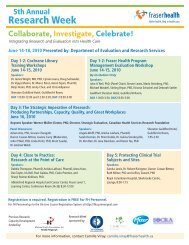Clinical Trials and Preclinical Infrastructure Asset Map - Genome BC
Clinical Trials and Preclinical Infrastructure Asset Map - Genome BC
Clinical Trials and Preclinical Infrastructure Asset Map - Genome BC
You also want an ePaper? Increase the reach of your titles
YUMPU automatically turns print PDFs into web optimized ePapers that Google loves.
APPENDIX 9. Healthcare Research Centres (cont’d)<br />
RESEARCH CENTRE/ URL CONTACT DESCRIPTION<br />
Down Syndrome<br />
Research Foundation<br />
(DSRF)<br />
http://www.dsrf.org/<br />
262<br />
DSRF initiates <strong>and</strong> participates in research that provides insight into the unique learning style of Down’s Syndrome individuals. Data<br />
collected is analysed <strong>and</strong> pilot interventions <strong>and</strong> educational programs are developed <strong>and</strong> offered. These programs test the underst<strong>and</strong>ing<br />
of the brain <strong>and</strong> are evaluated to observe the impact on DSRF students. Even the slightest increase in cognitive ability, the objective that<br />
drives our work, can make a significant difference in the level of support an individual with an intellectual disability may require.<br />
DSRF specialises in imaging brain activity through magnetoencephalography (MEG). MEG records the magnetic fields in the brain using<br />
sensitive devices called SQUIDs (Superconducting Quantum Interference Devices). MEG installed at DSRF has a whole cortex capability<br />
1409 Sperling Avenue<br />
Burnaby B.C. V5B 4J8<br />
Tel: 604-444-3773<br />
Toll-free in Canada at 1-888-464-<br />
DSRF<br />
Fax: 604-431-9248<br />
Contact: Naznin Virji-Babul, Director,<br />
Research<br />
naznin@dsrf.org<br />
<strong>BC</strong>MHARI aims to build capacity <strong>and</strong> promote networking among the diverse nodes in mental health research. In the addictions field,<br />
the Network is partnering with the Centre for Addictions Research of B.C. (CAR<strong>BC</strong>), <strong>and</strong> will aim to further exp<strong>and</strong> the partnerships <strong>and</strong><br />
infrastructures that have been initiated across the province.<br />
<strong>BC</strong>MHARI Network has provided funding to develop four Research <strong>and</strong> Knowledge Transfer Hubs:<br />
• Alcohol <strong>and</strong> Drug Monitoring Hub: aims to describe the main patterns of alcohol <strong>and</strong> other drug use <strong>and</strong> related harms in B.C..<br />
• <strong>Clinical</strong> Research Hub: is designed to assist researchers in the selection <strong>and</strong> employment of measures to assess cognition, substance use,<br />
<strong>and</strong> severe psychopathology.<br />
• Community Based Research Hub: aims to increase capacity for CBR in mental health <strong>and</strong> addictions by providing access to CBR-specific<br />
training, resources, <strong>and</strong> networking opportunities.<br />
• Pharmacoepidemiology Hub: is a resource for researchers interested in using B.C.’s prescription database, PharmaNet, to study patterns of<br />
B.C. Mental Health <strong>and</strong><br />
Addictions Research<br />
Institute (<strong>BC</strong>MHARI)<br />
www.mhanet.ca<br />
utilization of pharmacological agents in the treatment of mental illness <strong>and</strong> addiction.<br />
BRITISH COLUMBIA<br />
CARB is a provincial research network involving a partnership of SFU, Thompson Rivers University, the U<strong>BC</strong>, the UN<strong>BC</strong> <strong>and</strong> UVic, <strong>and</strong> administered<br />
by UVic. Advances public policy on substance use, harm reduction, <strong>and</strong> addiction issues in B.C. through research that sheds light on<br />
their social, cultural <strong>and</strong> psychological determinants.<br />
CARB core activities include:<br />
• To build research infrastructure <strong>and</strong> capacity across B.C. for the conduct of research that will increase underst<strong>and</strong>ing <strong>and</strong> support more<br />
effective responses to substance use<br />
• To conduct high-quality research that increases underst<strong>and</strong>ing of substance use <strong>and</strong> addiction, <strong>and</strong> informs effective responses<br />
• To disseminate research findings that increase underst<strong>and</strong>ing of substance use <strong>and</strong> addiction in order to increase awareness of related<br />
harms <strong>and</strong> to identify effective responses<br />
• To contribute to the implementation of evidence-based policy <strong>and</strong> practice.<br />
B.C. Mental Health <strong>and</strong> Addictions<br />
Research Network<br />
PHSA Research <strong>and</strong> Networks<br />
Suite 201-601 West Broadway<br />
Vancouver B.C. V5Z 4C2<br />
info@mhanet.ca<br />
Tel: 604.707.6390<br />
Fax: 604.707.6399<br />
Contact:<br />
Jane Hood Network Director<br />
Tel: 604.707.6393<br />
University of Victoria<br />
Technology Enterprise Facility<br />
Room 273 2300 McKenzie Ave<br />
Victoria B.C. V8P 5C2<br />
Tel: 250-472-5445<br />
Fax: 250-472-5321<br />
carbc@uvic.ca<br />
Contact: Timothy Stockwell, Director<br />
timstock@uvic.ca<br />
Tel: 250-472-5445<br />
Centre for Addictions<br />
Research of B.C.<br />
www.carbc.ca



